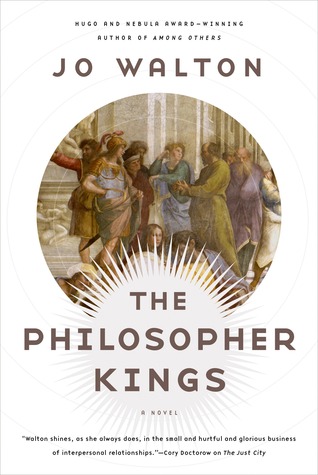The Philosopher Kings does not start straight after the climactic events of The Just City, Instead, the book is set about twenty years later.
(Warning: This review contains spoilers for The Just City)
Apollo, still living as a human, has been married to Simmea, and they have raised several children together. The book starts, cruelly, with Simmea's death in a minor skirmish. This is hard to take, as Simmea was the heart and soul of the first novel. Apollo, for the first time in his immortal life, experiences genuine grief and bereavement. It nearly destroys him.
Matters are not helped by the silly reasons for her death. She died, defending an artwork against raiders. After the events in The Just City, some of its citizens wanted to create their own Platonic utopias, diverging from the one created for them. Some wanted to pursue Plato's ideas more fervently and strictly, while others wanted to create a more Socratic republic of philosophers. The result of the splits are five different cities (including the original one), with different rules. While they share some things - the robots and the knowledge - other things were not distributed, including art. After some capture-the-flag style hijinx, campaigns of art theft turned violent. As all the youths had been trained in combat, skirmishes could be lethal, and Simmea dies in one such art raid.
As Simmea was the heart of the first novel, so their daughter Arete is the heart of the second novel. On the cusp of adulthood, this teenager has more common sense than her older brothers, more heart and brains and drive than almost anyone. While her father spends an awful lot of the novel moping, she navigates the stormy waters of grief, bereavement, first love, debate, demi-Godhood and more with that indomitable kernel of kindness and wisdom that is found in many of Jo Walton's characters.
Much of the novel is taken up with a journey to seek out Kebes, the former rebel who hated The Just City for enslaving him. As an exploratory journey, we meet other contemporaries of these ancient times, and see beyond doomed Atlantis for the first time. We also encounter yet another civilisation...
The Philosopher Kings is, like The Just City, an intelligent novel that thrives on discourse and thought experiments. What deflates it a little is that it is missing the zest that Socrates had provided. It is a much less playful novel. The first book was imbued with a certain sense of bemusement - watching academics and philosophers trying to set up a utopia and follow a rule book, watching fallible Gods having their own blind spots, watching Socrates reach out to robots and interrogate ideas... The Just City thrived on humour and playfulness, even if it featured rape and infanticide and other serious matters. The Philosopher Kings is less lighthearted. It starts with death and carries on through grief and vengeance. It touches on oppression and fear. It features horrendous torture. It's a story of folly and cruelty and tragedy, with lighter moments, whereas the first was a light story about folly with tragic and cruel moments.
The Just City is a novel about consent. The Philosopher Kings is a novel about consequences. I would recommend The Philosopher Kings to anyone who read The Just City, and I would recommend The Just City to just about everyone. That said, I do worry that the road ahead may be more rocky for our protagonists than I'd ever expected...
Rating: 4/5

No comments:
Post a Comment